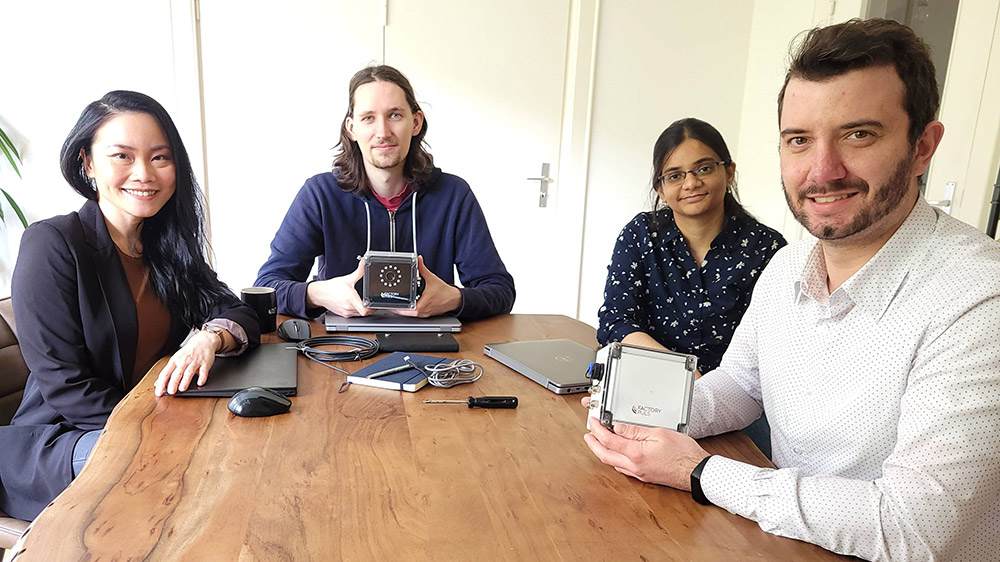FactoryPuls

Business idea: Toolbox for industry
Industry: IT
Year founded: 2020
The entrepreneurs strive for more efficient production and better working conditions
Category
On this page
FactoryPuls: Catapulting factories into Industry 4.0
Digitising complex and often aging factories and making them smart. This and nothing less is what the start-up FactoryPuls from Hamburg University of Applied Sciences (HAW Hamburg) wants to enable its customers from the manufacturing industry to do. The benefit: more efficient production and better working conditions.

Carlos Klein, founder of FactoryPuls, had wanted to set up his own start-up since he was a student at HAW Hamburg. What the dual student was still missing, however, was the right product idea. This was to come a few years and two detours later.
Via Vietnam and Belgium back to Hamburg
“In 2015, after my studies, I decided to see something of the world and went to Vietnam,” says Carlos. He liked it there so much that he stayed and started his own business as a freelancer for quality and lean management. Via a diversion to Belgium, where he delved deeper into the topic of digitalisation at Deloitte, he returned to Hamburg, his “home port”, five years after graduating – this time with the clear goal of building a start-up.
“The 5G standard was in the starting blocks at the time and no one had a real product, a gateway, to use it in industry,” Carlos recalls. This was the opportunity he and his team had been waiting for.
To work on the project, Mai Tran followed him to Hamburg. Mai studied linguistics and business management in Belgium and Vietnam, where she and Carlos met, and now works as Brand Marketing Manager in the team. Kevin Becker, who studied electrical engineering, completed the Exist team and came to the Elbe from Lübeck to work on the start-up. “I got in touch with Carlos and Mai through acquaintances and the product they wanted to work on immediately excited me,” says Kevin. “The fact that we were able to convince Kevin was an absolute stroke of luck for us,” says Mai.
Fittingly, Kevin, now a hardware engineer in the team, also had useful equipment at home, such as a 3D printer and a self-built CNC milling machine. “This enabled us to print important parts for our hardware ourselves – because of the pandemic, we couldn’t use the facility at HAW Hamburg as extensively as we had planned before the lockdown,” says Kevin.
The product: the toolbox
“What we offer our customers from industry can best be described as a toolbox for Industry 4.0,” says Carlos. Particularly in small and medium-sized enterprises, there is a great deal of interest today in further digitalising their own companies and taking advantage of the opportunities that come with it. At the same time, owners are often overwhelmed by a huge range of products and possibilities – IT departments are often very understaffed and overwhelmed with the implementation of such large projects as the digitalisation of entire production lines.
FactoryPuls wants to break down these barriers and offers manufacturing companies a one-stop solution: in addition to its toolkit consisting of its own hardware, gateway, IoT infrastructure, analytics and visualisation, the team therefore also offers customers extensive support, for example by means of close consulting, support and employee training.
The core promise is the digitalisation of entire production lines or warehouse facilities. And this without having to replace expensive, complex machines that often run with a wide variety of software. For this purpose, the start-up has two modular, expandable hardware products in its portfolio: Factory Lens and Factory Sens. These make it possible to read water consumption meters, detect temperature changes and vibrations or record stock levels with a variety of individually configurable sensors. Employees no longer have to run to the machine regularly to check status, function or stock. “Thanks to the modularity of the product, there are hardly any limits to the purposes for which it can be used,” says Carlos.
Data, analytics and individual solutions
All generated data is sent to the cloud via the gateway’s LTE, WiFi or 5G connection, where it is processed and analysed. They are then visualised for the customer on a customised dashboard, for example. “Thanks to the computing models that we can run on the Microsoft Azure platform, we are not only able to provide customers with a status report in real time. Rather, we can use predictive computing to make predictions about when a machine should best be maintained so that it does not break down – because that is particularly expensive for the operators,” explains Kevin.
Such components are always optional, however, because the team relies on highly individualised solutions with their toolbox model. “That makes our product particularly attractive for the companies with which we already cooperate and want to cooperate in the future. Because they don’t have to buy a rigid solution, but get exactly what will help them and their factory move forward – which then also means that the solution can be scaled much more easily at the customer’s afterwards,” Mai states.
External support and the big vision
The team, which is based at HAW Hamburg, has received support from their mentor Professor Henner Gärtner, Professor of Industrial Logistics, and Lisa Jessen, Startup Port consultant at HAW Hamburg, right from the start. “FactoryPuls is a very exciting and ambitious project that deservedly received EXIST funding from the federal government in 2020,” says Lisa, who also advises the team on their next steps.
And they are ambitious. The team, which has now been strengthened by the addition of machine learning expert Prathyusha Kanda, has set itself the goal of becoming the “leading partner of manufacturing companies in digitalisation” in the long term with its FactoryPuls GmbH.